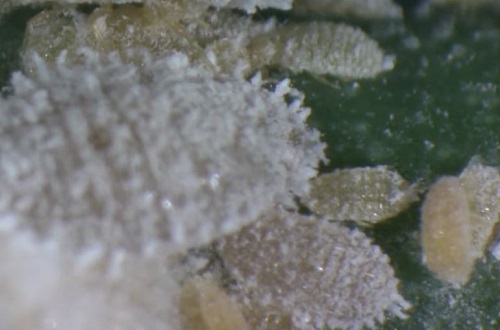New Insect Found Capable of Killing Bees
August 10, 2019
Bee Colony Collapse, Honey Bees
In a rather eye-opening report, researchers found honey bees may be in danger from insecticides used on crops other than the crops they are actually pollinating. This is an area we have not yet really seen explored, but this study presents a significant challenge for crops where the honey bee and mealybug cross paths.
What Is the Mealybug?
The mealybug is an unarmored insect that lives mostly in warm climates. This insect typically feeds on the plant juices of greenhouse plants, subtropical trees, and house plants. However, they are also known to consume stored fruit. Many of the plants these insects feed on are treated with insecticides known to be harmful to the honey bee, which is where the problem arises.
When the mealybug eats, it secretes a thin wax layer (called honeydew) on the surface of the crop it is eating. This serves as a sort of protection for the mealybug. The problem for honey bees, however, is that this waxy layer will contain the insecticide used to treat the crop. If the insect previously consumed a crop that was treated with a harmful insecticide then lands on a crop the honey bee uses as food, the honey bee is likely to consume what is now a deadly substance for the honey bee.
The Study
The new study examined the impact of the mealybug secretion on hoverflies and parasitic wasps, pollinators with similar habits to that of the honey bee. They treated clementine trees with two common insecticides, thiamethoxam and imidacloprid. Then they infested the trees with the mealybug. They took the resulting honeydew and fed it to the pollinating insects.
In the control group, roughly 14 percent of the insects died. In the other two groups, nearly 70 percent of the pollinators died. Because this honeydew is extremely abundant in crop fields, the researchers believe this is even more deadly than plant nectar that is contaminated with insecticides. While it is only one study, it could very well explain much of the unexplained losses beekeepers are seeing throughout the world.
The one thing this does not explain, however, is the extreme loss many cold-weather states are experiencing right now. Could the large numbers of losses simply be due to extreme weather and weather oddities these states have seen over the last few years or could it be something similar to the mealybug that is killing off bees in these cold-weather states?
Source: Science Magazine, Photo via Koppert Biological Systems Youtube Video Screenshot


.jpg)



